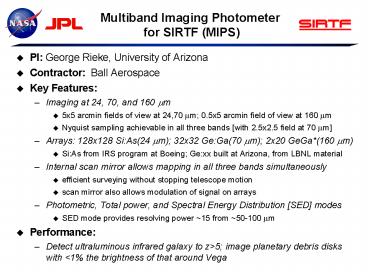MW59 - PowerPoint PPT Presentation
1 / 8
Title:
MW59
Description:
Si:As from IRS program at Boeing; Ge:xx built at Arizona, from LBNL material ... Scan Map Data. The MIPS simulated sky is a 70 micron simulated scan map about ... – PowerPoint PPT presentation
Number of Views:48
Avg rating:3.0/5.0
Title: MW59
1
Multiband Imaging Photometer for SIRTF (MIPS)
- PI George Rieke, University of Arizona
- Contractor Ball Aerospace
- Key Features
- Imaging at 24, 70, and 160 ?m
- 5x5 arcmin fields of view at 24,70 ?m 0.5x5
arcmin field of view at 160 ?m - Nyquist sampling achievable in all three bands
with 2.5x2.5 field at 70 ?m - Arrays 128x128 SiAs(24 ?m) 32x32 GeGa(70 ?m)
2x20 GeGa(160 ?m) - SiAs from IRS program at Boeing Gexx built at
Arizona, from LBNL material - Internal scan mirror allows mapping in all three
bands simultaneously - efficient surveying without stopping telescope
motion - scan mirror also allows modulation of signal on
arrays - Photometric, Total power, and Spectral Energy
Distribution SED modes - SED mode provides resolving power 15 from
50-100 ?m - Performance
- Detect ultraluminous infrared galaxy to zgt5
image planetary debris disks with lt1 the
brightness of that around Vega
2
Integrated MIPS Provides Imaging/Surveying/Spectra
l Capabilities
From Telescope
3
MIPS Critical Elements Focal Planes, Filters,
and Scan Mirror
160mm
24mm
70mm
24mm array provided through the IRS program
70 160mm arrays developed at University of AZ
Cryogenic scan mirror mechanism built _at_ Ball
based on design from ISO Short
Wavelength Spectrometer
Far infrared filters (over 70mm array) from
Queen Mary College
CSMM
4
Simulated MIPS 70 micron Scan Map Data
The MIPS simulated sky is a 70 micron simulated
scan map about 35 arcminutes square
Median Cirrus Flux 24 mm 1.3x105
Jy/sr 70 mm 3.9x105 Jy/sr 160 mm
9.7x105 Jy/sr
Simulation by Chad Engelbracht (MIPS) go to
http//mips.as.arizona.edu
5
Source Counts from MIPS Image at 70mm
6
MIPS Simulated Photometry Data - 70 micron Channel
0.7 Jy star (point source) at 70 mm Zodiacal
Background 8 MJy/sr
Time
Stimulator flash
7
Simulated MIPS 24 and 70 micron Observations of
Circumstellar Disks
Below are simulated 70 mm observations convolved
with a model of the SIRTF Point Spread Function.
Left to Right Vega, 1/10 as much dust as Vega, a
point source. All are on a logarithmic brightness
scale.
Left are simulated 24 mm observations convolved
with a model of the SIRTF PSF on a logarithmic
brightness scale. The left image is Vega. On the
right is the difference of a Vega-like star with
1/100 times less dust and a point source of the
same total flux.
Simulations by Ned Wright (UCLA)
8
MIPS Flight Array Tests
December
April
24mm
70mm































